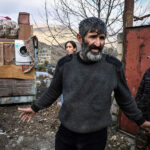A court in Muzaffarnagar, Uttar Pradesh, has acquitted eight men who were charged with setting fire to a house and killing a family during the communal riots that rocked the district in 2013. The court said that there was no conclusive proof to link the accused to the crime and that the prosecution had failed to produce any eyewitnesses or forensic evidence.
The eight men, identified as Azadpal, Jitender, Parul, Vikas, Gaurav, Kuldeep, Sanjay and Mithlesh, were among the 12 people named in a first information report (FIR) filed by one Mohammad Akram, whose house was allegedly torched by a mob of Jats on September 8, 2013. Akram’s wife, two sons and a daughter were killed in the blaze, while he and his two other daughters managed to escape.
The FIR accused the eight men of rioting, arson, murder and attempt to murder under various sections of the Indian Penal Code. However, during the trial, none of the surviving members of Akram’s family could identify any of the accused as the perpetrators. The police also did not recover any weapons or inflammable materials from the possession of the accused. The court noted that the police had relied solely on the statement of Akram, who had named the accused on the basis of hearsay and suspicion.
The court also observed that there were discrepancies in the statements of Akram and his daughters regarding the time and sequence of events on the day of the incident. Moreover, the post-mortem reports of the deceased did not mention any injuries caused by sharp weapons or firearms, which contradicted Akram’s claim that the mob had attacked his family with swords and guns before setting fire to his house.
The court said that in the absence of any direct or circumstantial evidence to prove the involvement of the accused in the crime, it had no option but to acquit them. The court also expressed its sympathy for Akram and his family and said that it was unfortunate that they had not received justice.

The Muzaffarnagar riots were one of the worst incidents of communal violence in India in recent history. The clashes between Hindus and Muslims erupted on September 7, 2013, after a Hindu girl was allegedly harassed by a Muslim boy in Kawal village. In retaliation, two Hindu brothers killed the boy and were lynched by a Muslim mob. The violence soon spread to other parts of the district, resulting in at least 62 deaths and displacing over 50,000 people.
The riots also had political ramifications as several leaders from different parties were accused of inciting or participating in the violence. The Supreme Court of India held the state government led by Samajwadi Party responsible for negligence in preventing and controlling the riots and ordered it to arrest all those involved irrespective of their political affiliation.
In 2021, however, a local court allowed the BJP government to withdraw a case against 12 BJP leaders who were charged with provoking the riots. In 2022, a special court convicted BJP MLA Vikram Singh Saini and 11 others of rioting and sentenced them to two years imprisonment.
The acquittal of the eight men in the arson and murder case has raised questions about the fairness and effectiveness of the judicial process in dealing with such cases. It has also added to the sense of insecurity and injustice among the victims and survivors of the riots, who are still struggling to rebuild their lives.









